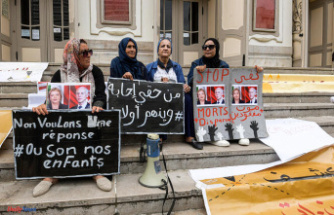How to improve the safety of caregivers against the risk of attacks? The tragedy in Reims during which a 38-year-old CHU nurse lost her life on Tuesday, after being stabbed on Monday by a "manifestly unbalanced" patient, and while a 59-year-old medical secretary was seriously injured, brings back to the fore front of the stage this issue of violence.
Doctor Patrick Pelloux, president of the Association of Emergency Physicians of France, evokes "these extremely rare facts but which are very present in [their] profession". "I liken it in my memory to the assassination of a nurse and a caregiver in Pau, in 2004, by a patient. We must remember that we are treating people, the sick, with no more protection than that. Zero risk does not exist, we cannot transform the hospital into a bunker, but we must all the same give ourselves the means to do our job correctly, especially in these difficult contexts. »
For the former Charlie Hebdo columnist, "hospital caregivers are the last wheel of the carriage. They really face great violence from society.” "I have a colleague, young, very dynamic, who loves her job very much, but who is going to leave her post in the emergency room of a large Parisian hospital because she can no longer hear threats from patients. Some have already given him the sign that they were going to cut his throat. Or called her a whore. It is no longer possible to let this pass. However, Doctor Pelloux is skeptical about the reinforcement of security means.
“At Lariboisière Hospital in Paris, they have put in place increased surveillance with more officers and security gates. But we cannot generalize this to all hospitals and all services, we are not an airport, that would be impossible. "After the tragedy at the University Hospital of Pau, "alarm buttons" had been installed in certain sensitive services to be able to quickly alert the police. These types of measures will be examined by the Minister of Health François Braun, who has promised "before the end of the week" to make announcements on this subject, after discussing it with the unions.
In Reims, the patient, unbalanced, was indicted for aggravated violence, but had obtained a dismissal for criminal irresponsibility. The facts did not occur in the emergency room, but in a preventive medicine service, a priori calm. The investigation will have to elucidate what happened but demonstrates that it is the whole hospital which can be concerned, and not only this or that department "at risk". “I cannot comment specifically on this drama. But I have a question anyway. How was this patient cared for? Isn't this a consequence of the decay of public psychiatry? asks Professor Bernard Granger, psychiatrist and professor at CHU Cochin, in Paris.
The question is very sensitive for the health professions, in particular nurses, many of whom want to flee the hospital. The president of the Order of Nurses, Patrick Chamboredon, tells us of his "indignation after this tragedy". "It's mind-blowing to imagine that people who go to work in the morning will not return home in the evening. We need more protection for our public service. As in emergencies, it may be necessary to put in place more restrictions in access to certain services. It's complicated because everyone knows that open access to all is a necessary condition for the operation of the hospital. However, solutions must be found. Doctor Maurice Bensoussan, president of the Syndicat des psychiatres français, adds: “This drama in Reims is horrible. Beyond the emotion, it is a global policy that needs to be reviewed. You cannot practice medicine feeling in danger. Psychiatrists, in hospitals or in town offices, are regularly threatened. We need more resources for psychiatry. »
This also concerns city doctors a lot. Coincidentally, the National Council of the Order of Physicians (Cnom) released its "observatory on violence" on Tuesday. It reports a "historic peak" in the facts recorded in 2022, up 23% compared to the average. 1,244 acts of violence (assaults, verbal abuse, theft, incivility) were recorded by the Cnom. We learn that 900 general practitioners were attacked, ahead of… psychiatrists, followed by gynecologists-obstetricians and occupational physicians. A third of acts of violence are caused by "reproaches" made by patients about their care, or refusals to prescribe work stoppages. The title of the Order's communication sadly echoes the terrible drama of Reims: "We are taking care of you, thank you for taking care of us".












